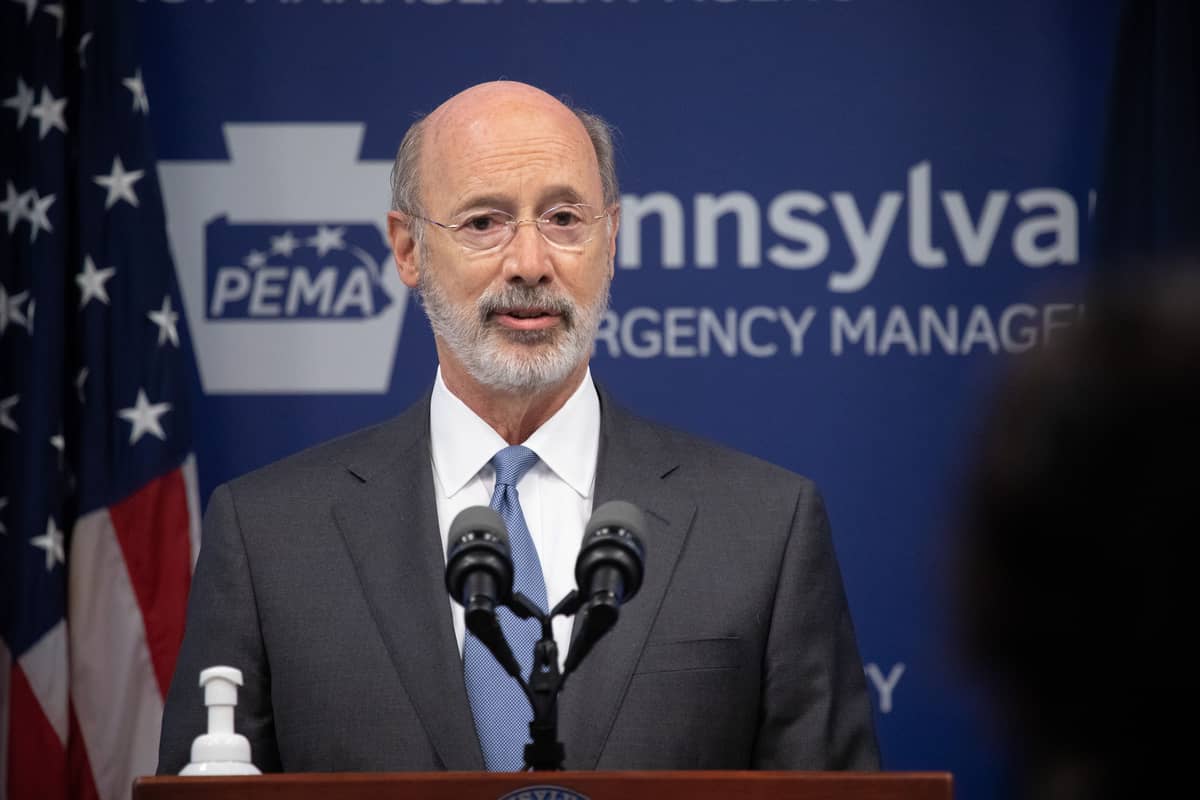This article is shared with LebTown by content partner Spotlight PA.
By Charlotte Keith of Spotlight PA
Spotlight PA is an independent, nonpartisan newsroom powered by The Philadelphia Inquirer in partnership with the Pittsburgh Post-Gazette and PennLive/Patriot-News. Sign up for our free weekly newsletter.
HARRISBURG — The GOP-controlled legislature cannot force Gov. Tom Wolf to end his coronavirus disaster declaration, a divided state Supreme Court ruled Wednesday, handing the Democratic governor a victory that could be vital should cases surge again.
In the ruling, the high court rejected the argument that the legislature can unilaterally terminate the governor’s emergency powers by resolution. Writing for the majority, Justice David Wecht emphasized that the court was not offering an opinion on Wolf’s response to the pandemic, but rather whether lawmakers could act without facing the governor’s veto.
The resolution “required presentment,” Wecht wrote, “a key component of our Constitution’s balance of powers among the several branches of government, a balance that prevents one branch from dominating the others.”
The justices also ruled the governor’s actions to suspend laws are consistent with the powers the legislature granted him.
“Current members of the General Assembly may regret that decision, but they cannot use an unconstitutional means to give that regret legal effect,” Wecht wrote, adding, “the powers delegated to the Governor are admittedly far-reaching, but nonetheless are specific.”
Click here to donate to Spotlight PA
In March, Wolf issued the emergency order as Pennsylvania began reporting its first COVID-19 infections. The declaration greatly expanded Wolf’s powers, allowing him to suspend regulations and control travel to and from certain areas. At the same time, Wolf and Health Secretary Rachel Levine ordered the closure of all businesses except those deemed “life-sustaining” to slow the spread of the virus and keep hospitals from becoming overwhelmed.
Republican leaders in the legislature decried the closures as unfair to small businesses, and pushed to reopen sectors of the economy through legislation, which Wolf vetoed.
In early June, Republicans and a handful of Democrats gave final approval to a resolution that leadership said would compel Wolf to terminate the disaster declaration. GOP lawmakers argued state law provides the option as a check on the executive branch, while Wolf said he’s empowered by the Constitution to approve or reject the resolution, as he can with legislation.
The high court sided with Wolf and nullified the legislature’s resolution.
“The administration is pleased with the Supreme Court’s decision keeping in place the disaster proclamation to assist in the state’s response to the pandemic and to provide protections for businesses, workers, and residents,” a Wolf spokesperson, Lyndsay Kensinger, said.
Top Senate Republican Joe Scarnati, of Jefferson County, said in a statement the ruling “fails to uphold the constitutional balance of power between the three, co-equal branches of government.”
“The court has essentially granted the governor king status,” Senate Majority Leader Jake Corman (R., Centre) said.
The case largely centered around a portion of the state’s emergency code, which says, in part, “The General Assembly by concurrent resolution may terminate a state of disaster emergency at any time. Thereupon, the governor shall issue an executive order or proclamation ending the state of disaster emergency.”
The legislature argued that “shall issue” meant the governor had to comply should the resolution be passed. But Wolf argued he still had the power to accept or reject the resolution, a necessary check and balance to prevent the legislature from interfering during an emergency.
Republicans, however, decried that position, claiming it allowed Wolf to indefinitely declare an emergency and assume far greater power unless and until two-thirds of the House and Senate voted to override his veto of the resolution — a tough bar to meet in Pennsylvania.
In his defense, Wolf contended that ending the disaster declaration would not allow businesses to fully reopen — which was the impetus for the GOP’s action — because much of his administration’s power to impose restrictions stems from a law governing disease prevention.
Instead, Wolf argued, ending the declaration would rescind protections that were enacted in response to the pandemic and the subsequent economic downturn, such as the suspension of licensing requirements for health-care workers or a temporary moratorium on evictions and foreclosures.
“Ending the disaster declaration would not reopen anything. It just wouldn’t,” Wolf said in June. “And anybody who says differently is wrong.”
The ruling was the first of two constitutional showdowns between Wolf and the legislature. Still pending is a Republican suit to force the Wolf administration to comply with a subpoena for documents related to the state’s coronavirus business waiver program that allowed some non-essential businesses to reopen, while others had to remain shuttered.
100% ESSENTIAL: Spotlight PA relies on funding from foundations and readers like you who are committed to accountability journalism that gets results. If you value this reporting, please give a gift today at spotlightpa.org/donate.
Read all of LebTown’s COVID-19 coverage here.
Is there a story you think LebTown should report? Let our newsroom know using the form below.
Help us provide journalism Lebanon County needs.
If you are thankful for LebTown, consider joining as a member. Members get an inside look at our publishing schedule each week, plus invites to a members-only Facebook group and happy hours.
Learn more and join now here.
Subscribe to our newsletter for updates each weekday at 3 p.m.
























